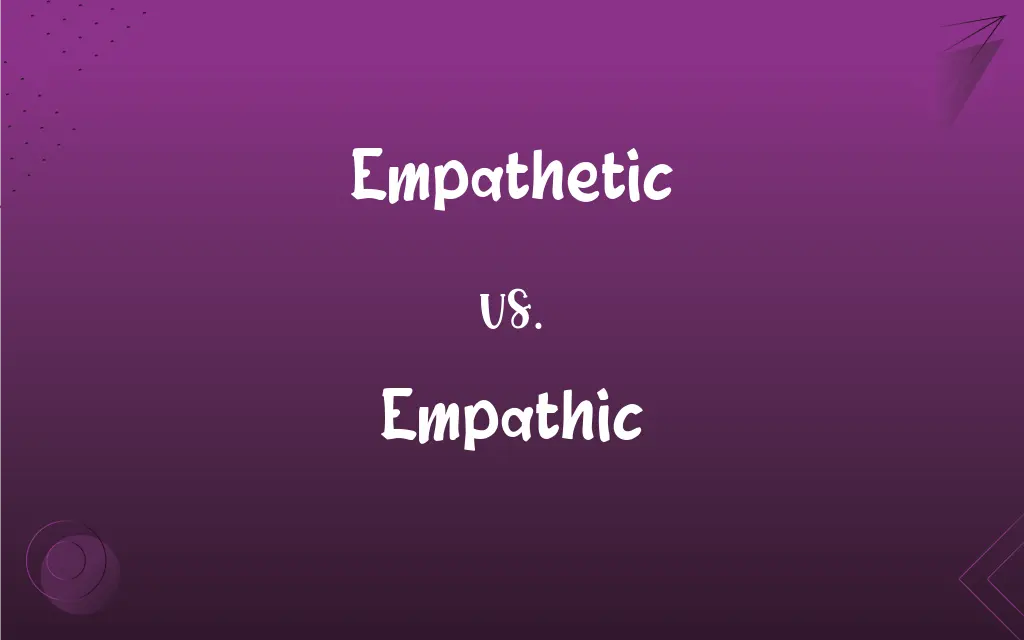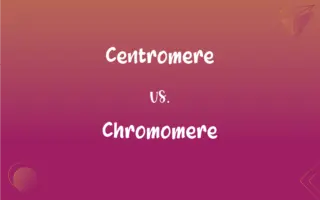Empathetic vs. Empathic: What's the Difference?
Edited by Janet White || By Harlon Moss || Updated on October 26, 2023
Both "empathetic" and "empathic" refer to the ability to understand and share the feelings of another, with "empathetic" being a more common usage.

Key Differences
"Empathetic" and "empathic" both derive from the word "empathy," which is the capacity to recognize, relate to, or even feel the emotions experienced by another being. While both words can be used interchangeably in many contexts, "empathetic" is more frequently encountered in everyday speech and writing.
Interestingly, "empathic" has an older historical origin compared to "empathetic." Yet, in contemporary usage, "empathetic" has gained more popularity, possibly because it aligns with other adjectives like "sympathetic."
Professionals in the field of psychology might lean towards the word "empathic" in certain contexts. On the other hand, "empathetic" is widely used in casual conversations and literature, signifying its broad acceptance in daily American English.
From a grammatical standpoint, there's minimal difference between "empathetic" and "empathic." The suffixes "-etic" and "-ic" are both used to form adjectives, and neither alteration changes the word's inherent meaning.
It's crucial to understand that while "empathetic" and "empathic" may have nuanced differences in usage, their core meanings revolve around the idea of understanding and relating to another's feelings, making them largely synonymous.
ADVERTISEMENT
Comparison Chart
Common Usage
More common in everyday speech and writing
Less common compared to "empathetic"
Historical Origin
Newer in linguistic evolution
Older historical origin
Preferred in Professional Use
Common in literature and general discourse
Often preferred in psychological contexts
Suffix
Uses the suffix "-etic"
Uses the suffix "-ic"
Core Meaning
Relating to understanding and sharing feelings
Relating to understanding and sharing feelings
ADVERTISEMENT
Empathetic and Empathic Definitions
Empathetic
Empathetic means showing an ability to understand and share the feelings of another.
She had an empathetic demeanor, always understanding others' pain.
Empathic
Empathic pertains to the psychological identification with others' feelings.
Her empathic abilities were evident when she consoled her friend.
Empathetic
Empathetic refers to having or demonstrating empathy.
His empathetic response showed that he truly cared.
Empathic
Empathic signifies an inherent capability to recognize and relate to the emotions of others.
She had an empathic presence, often feeling the moods of those nearby.
Empathetic
Empathetic pertains to the capability to relate to others' emotional experiences.
Because of his empathetic qualities, he was everyone's confidant.
Empathic
Empathic refers to the quality of deeply resonating with another's emotional experience.
Her empathic demeanor meant she was never dismissive of others' feelings.
Empathetic
Empathetic describes someone who can vicariously experience the emotions of others.
Her empathetic nature made her a great counselor.
Empathic
Empathic is about sensing and understanding another's emotions.
Being empathic, he could always tell when someone was upset.
Empathetic
Empathetic signifies a deep resonance with the emotions and feelings of those around.
The nurse was empathetic, comforting patients in distress.
Empathic
Empathic denotes a deep connection and understanding of others' emotional states.
His empathic insights allowed him to mediate conflicts effectively.
Empathetic
Empathic.
Empathic
Of, relating to, or characterized by empathy.
Empathetic
Showing empathy for others, and recognizing their feelings; empathic.
Empathic
Showing or expressing empathy.
Empathetic
Showing empathy or ready comprehension of others' states;
A sensitive and empathetic school counselor
Empathic
(science fiction) Of, pertaining to, or being an empath: of or having the capability of sensing the emotions of others.
Empathic
Showing empathy or ready comprehension of others' states;
A sensitive and empathetic school counselor
FAQs
Is "empathetic" more commonly used than "empathic"?
Yes, "empathetic" is more frequently encountered in everyday speech and writing.
Are there any grammatical differences between the two words?
Both are adjectives; "empathetic" uses the suffix "-etic" while "empathic" uses "-ic."
Are "empathetic" and "empathic" synonymous?
Yes, both words largely refer to the ability to understand and share the feelings of another.
Do professionals in psychology prefer one term over the other?
Some professionals in psychology might lean towards "empathic" in specific contexts.
Is there a significant difference in meaning between "empathetic" and "empathic"?
No, their core meanings both revolve around understanding and relating to another's feelings.
Which word has been in the English language longer?
"Empathic" has an older historical origin compared to "empathetic."
Can businesses benefit from being "empathetic" or "empathic"?
Yes, businesses that show understanding and relate to their customers' feelings can build better relationships and trust.
Is "empathetic" more casual in usage?
"Empathetic" is widely used in both casual conversations and literature.
Are there any notable linguistic patterns with words ending in "-etic" and "-ic"?
Both suffixes "-etic" and "-ic" are used to form adjectives, and neither alteration significantly changes a word's inherent meaning.
Does "empathic" relate to any specific psychological theories or practices?
"Empathic" is often used in the context of therapeutic practices where understanding and resonating with a client's feelings is crucial.
Do both words come from the noun "empathy"?
Yes, both "empathetic" and "empathic" derive from the word "empathy."
Do "empathetic" and "empathic" have any antonyms?
Antonyms might include "unsympathetic," "apathetic," or "indifferent."
Are "empathetic" and "sympathetic" the same?
No, while both involve understanding feelings, "sympathy" is more about feeling compassion for someone's situation, while "empathy" involves actually feeling what the other person feels.
Does "empathic" have any specialized use in academic or professional settings?
While both terms can be used broadly, "empathic" might be preferred in certain psychological contexts.
In which contexts might "empathic" be more appropriate?
"Empathic" may be more appropriate in professional or academic contexts, especially within psychology.
Are there any cultural variations in the use of "empathetic" and "empathic"?
While the core meanings remain consistent, regional linguistic preferences might exist. In American English, "empathetic" is more commonly used.
Why might "empathetic" be more popular in daily usage?
Its popularity might stem from its alignment with other adjectives like "sympathetic."
Can someone be described as both "empathetic" and "empathic"?
Yes, both terms describe someone who understands and shares the feelings of another.
How can I remember the difference between "empathetic" and "empathic"?
Remember that while both relate to empathy, "empathetic" is more common in everyday language, and "empathic" is sometimes preferred in professional contexts.
Can I use "empathetic" and "empathic" interchangeably in a sentence?
In most contexts, they can be used interchangeably without altering the sentence's meaning.
About Author
Written by
Harlon MossHarlon is a seasoned quality moderator and accomplished content writer for Difference Wiki. An alumnus of the prestigious University of California, he earned his degree in Computer Science. Leveraging his academic background, Harlon brings a meticulous and informed perspective to his work, ensuring content accuracy and excellence.
Edited by
Janet WhiteJanet White has been an esteemed writer and blogger for Difference Wiki. Holding a Master's degree in Science and Medical Journalism from the prestigious Boston University, she has consistently demonstrated her expertise and passion for her field. When she's not immersed in her work, Janet relishes her time exercising, delving into a good book, and cherishing moments with friends and family.































































